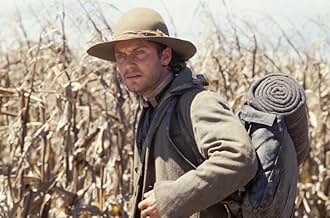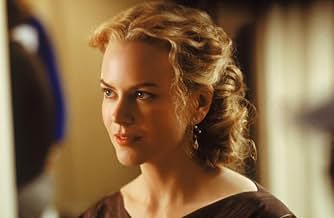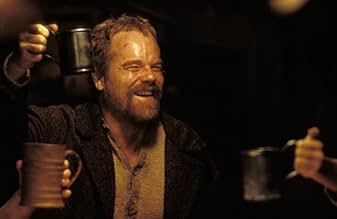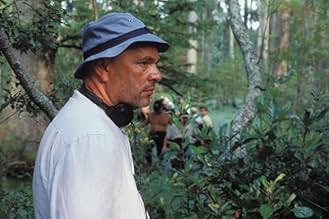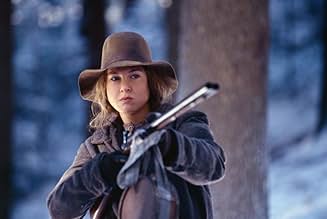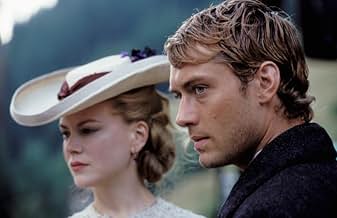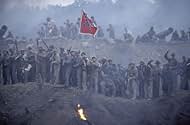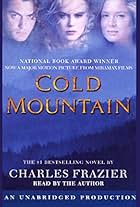In the waning days of the American Civil War, a wounded soldier embarks on a perilous journey back home to Cold Mountain, North Carolina to reunite with his sweetheart.In the waning days of the American Civil War, a wounded soldier embarks on a perilous journey back home to Cold Mountain, North Carolina to reunite with his sweetheart.In the waning days of the American Civil War, a wounded soldier embarks on a perilous journey back home to Cold Mountain, North Carolina to reunite with his sweetheart.
- Director
- Writers
- Stars
- Won 1 Oscar
- 20 wins & 101 nominations total
- Director
- Writers
- All cast & crew
- Production, box office & more at IMDbPro
Featured reviews
7sol-
A strongly acted and always interesting portrait of the hardships that came with the American Civil War, not only for soldiers but for those who did not fight too. The times are portrayed well, with sets and costumes that cannot be faulted. What can be flawed in the film however is the central romance, which is without much spark or realism. But all the action surrounding the romance is great, with some good-natured humorous touches, wonderful supporting characters and the perfect picture overall of life during the American Civil War. The cast is superb, with Zellweger in particular undergoing a superb transformation from her typical roles. The film is generally well written and well directed by Minghella, so that in spite of a lackluster romance, the film is still a captivating and entertaining watch.
Anthony Minghela's (writer/director) Cold Mountain is a carefully constructed, sensitive, and intelligent drama set in the social context of the confederacy during the civil war. It deals with the politics of the war in a very subtle and realistic manner. While it accurately depicts the brutality and inhumanity of that war, it also does something that many films related to this period do not handle effectively - Cold Mountain studies the southern context from the inside out, and portrays changes among the non-slave owning common people wrought by the war. Almost uniquely, Cold Mountain does not over-generalize southerners, northerners or anybody else.
The film surfs through genres as needed - never presenting a dull moment. It is a romance, a war story, an action-adventure and historical fiction, all nicely woven into one.
The story centers on Inman (Jude Law) and Ada Monroe (Nicole Kidman), who are smitten with each other for very simple reasons. As this young romance begins to bud, Inman enlists in the confederate army, taking with him a book Ada has given him and a photograph of her. Ada's character is one of the most brilliant aspects of the film, which is important because the audience experiences this film from a third person perspective, but the story is clearly hers from the beginning to the end. Ada is an intelligent southern belle and daughter of a liberal minister. She begins the film as a daddy's girl skilled in many of the arts that southern women who have been surrounded by servants most of their lives were expected to learn. In other words, as she admits to Ruby Thewes (Renee Zellweger), she is a master of everything useless.
Ada's father passes on, and she is left to manage his modest estate by herself. With no experience of this sort, she struggles, and survives by holding the memory of Inman close to her heart. Ruby enters the picture as a tough young woman who has been raised by a drunk and negligent father. Ruby has all the skills and abilities Ada lacks, and as they become inseparable business partners, they grow to love one another as best friends. Inman's experience is radically different, but something of a mirror image. During his participation in the war, he sees many friends killed for causes they don't really believe in, and decides to desert. Nobody he meets comes to his rescue as he begins the thousand mile walk back to Cold Mountain and Ada, and most of those he meets die.
The bulk of the film takes place during Inman's long walk, following both of the protagonists as they live, learn, grow and change. An on-going act of will borne of desperation preserves their intense passionate love. For Inman, it is his only source of hope in a world of pure desperation. For Ada, it is very much the same thing, but also a symbol and remnant of the old south - a world which is rapidly passing.
The cinematography is powerful and breathtaking. There are beautiful shots of Appalachian landscapes which give the film a strong sense of history. The script and editing are also extremely strong - emphasizing the broad class and educational differences reflected in the ante bellum southern dialects of the middle and lower classes. With the cast of this film, nothing short of perfection should be expected. And the cast, mostly, rises to the occasion. My one criticism, however, relates to the accents adopted by Kidman and Law's characters. An Australian and a Brit probably should not be expected to accurately reproduce southern American speech, but there are a few occasions where these two exceptionally gifted actors produce distracting vocal slips. I admit my oversensitivity to this, and can say with some confidence that it won't bother most people. Zellweger's performance is outstanding and she creates a character I will remember into my senescence.
Very highly recommended.
The film surfs through genres as needed - never presenting a dull moment. It is a romance, a war story, an action-adventure and historical fiction, all nicely woven into one.
The story centers on Inman (Jude Law) and Ada Monroe (Nicole Kidman), who are smitten with each other for very simple reasons. As this young romance begins to bud, Inman enlists in the confederate army, taking with him a book Ada has given him and a photograph of her. Ada's character is one of the most brilliant aspects of the film, which is important because the audience experiences this film from a third person perspective, but the story is clearly hers from the beginning to the end. Ada is an intelligent southern belle and daughter of a liberal minister. She begins the film as a daddy's girl skilled in many of the arts that southern women who have been surrounded by servants most of their lives were expected to learn. In other words, as she admits to Ruby Thewes (Renee Zellweger), she is a master of everything useless.
Ada's father passes on, and she is left to manage his modest estate by herself. With no experience of this sort, she struggles, and survives by holding the memory of Inman close to her heart. Ruby enters the picture as a tough young woman who has been raised by a drunk and negligent father. Ruby has all the skills and abilities Ada lacks, and as they become inseparable business partners, they grow to love one another as best friends. Inman's experience is radically different, but something of a mirror image. During his participation in the war, he sees many friends killed for causes they don't really believe in, and decides to desert. Nobody he meets comes to his rescue as he begins the thousand mile walk back to Cold Mountain and Ada, and most of those he meets die.
The bulk of the film takes place during Inman's long walk, following both of the protagonists as they live, learn, grow and change. An on-going act of will borne of desperation preserves their intense passionate love. For Inman, it is his only source of hope in a world of pure desperation. For Ada, it is very much the same thing, but also a symbol and remnant of the old south - a world which is rapidly passing.
The cinematography is powerful and breathtaking. There are beautiful shots of Appalachian landscapes which give the film a strong sense of history. The script and editing are also extremely strong - emphasizing the broad class and educational differences reflected in the ante bellum southern dialects of the middle and lower classes. With the cast of this film, nothing short of perfection should be expected. And the cast, mostly, rises to the occasion. My one criticism, however, relates to the accents adopted by Kidman and Law's characters. An Australian and a Brit probably should not be expected to accurately reproduce southern American speech, but there are a few occasions where these two exceptionally gifted actors produce distracting vocal slips. I admit my oversensitivity to this, and can say with some confidence that it won't bother most people. Zellweger's performance is outstanding and she creates a character I will remember into my senescence.
Very highly recommended.
Anthony Minghella knew something of the Civil War in locating his story in North Carolina. Of all the states that seceded to form the Confederacy, North Carolina may have been the most reluctant. It's Governor Zebulon Vance who is mentioned in the story dragged his feet in giving help to the Confederate government and its citizens save for the east where the plantations were never really embraced the Southern cause. Jude Law's attitude about fighting for a rich man to own slaves was not at all uncommon in North Carolina.
Which after a well staged recreation of the siege at Petersburg which when the north blew up the Confederate defenses by tunneling under and mining them with explosives did not have the desired result, Law decides he's sick of war and just quits to go back to his sweetheart Nicole Kidman on Cold Mountain. In the meantime Nicole is having her own problems just keeping body, soul, and property together on the small family farm. So the film proceeds along two tracks of Law's journey and Kidman's problems.
The stronger track for me is clearly Kidman and her problems. Renee Zellweger won a Best Supporting Actress Award for playing a young white trash woman who Kidman takes on for just board and feed to help with the farm. Without her help the farm's survival would be problematic although she has to put up with some pithy observation as well. Zellweger invests this simple character with so many dimensions her performance even without the Oscar capping it is her personal best. Kidman while not to the plantation manor born being the daughter of minister Donald Sutherland also is not used to manual farm labor. She grows in character as the film progresses.
As for Law and Kidman as well he has to worry about the Home guard, a self appointed group of militia taking over because official government machinery has broken down. Probably before the war they were slave catchers, now they hunt deserters and those who aid and abet them. Giovanni Ribisi also scores well as a young man in the home guard who declined to serve at places like Petersburg. Ribisi is some piece of work.
Besides Zellweger's Oscar, Cold Mountain was deservedly nominated for a flock of other Oscars. It's a marvelous look at the decline of the Confederacy, a cause that simply would not die quietly. In its own way the survivors are invested with the same kind of nobility that the Gone With The Wind cast was.
Which after a well staged recreation of the siege at Petersburg which when the north blew up the Confederate defenses by tunneling under and mining them with explosives did not have the desired result, Law decides he's sick of war and just quits to go back to his sweetheart Nicole Kidman on Cold Mountain. In the meantime Nicole is having her own problems just keeping body, soul, and property together on the small family farm. So the film proceeds along two tracks of Law's journey and Kidman's problems.
The stronger track for me is clearly Kidman and her problems. Renee Zellweger won a Best Supporting Actress Award for playing a young white trash woman who Kidman takes on for just board and feed to help with the farm. Without her help the farm's survival would be problematic although she has to put up with some pithy observation as well. Zellweger invests this simple character with so many dimensions her performance even without the Oscar capping it is her personal best. Kidman while not to the plantation manor born being the daughter of minister Donald Sutherland also is not used to manual farm labor. She grows in character as the film progresses.
As for Law and Kidman as well he has to worry about the Home guard, a self appointed group of militia taking over because official government machinery has broken down. Probably before the war they were slave catchers, now they hunt deserters and those who aid and abet them. Giovanni Ribisi also scores well as a young man in the home guard who declined to serve at places like Petersburg. Ribisi is some piece of work.
Besides Zellweger's Oscar, Cold Mountain was deservedly nominated for a flock of other Oscars. It's a marvelous look at the decline of the Confederacy, a cause that simply would not die quietly. In its own way the survivors are invested with the same kind of nobility that the Gone With The Wind cast was.
'War movie' is a Hollywood genre that has been done and redone so many times that clichéd dialogue, rehashed plot and over-the-top action sequences seem unavoidable for any conflict dealing with large-scale combat. Once in a while, however, a war movie comes along that goes against the grain and brings a truly original and compelling story to life on the silver screen. The Civil War-era "Cold Mountain," starring Jude Law, Nicole Kidman and Renée Zellweger is such a film.
Then again, calling Cold Mountain" a war movie is not entirely accurate. True enough, the film opens with a (quite literally) quick-and-dirty battle sequence that puts "Glory" director Edward Zwick shame. However, "Cold Mountain" is not so much about the Civil War itself as it is about the period and the people of the times. The story centers around disgruntled Confederate soldier Inman, played by Jude Law, who becomes disgusted with the gruesome war and homesick for the beautiful hamlet of Cold Mountain, North Carolina and the equally beautiful southern belle he left behind, Ada Monroe, played by Nicole Kidman. At first glance, this setup appears formulaic as the romantic interest back home gives the audience enough sympathy to root for the reluctant soldier's tribulations on the battlefield. Indeed, the earlier segments of the film are relatively unimpressive and even somewhat contrived.
"Cold Mountain" soon takes a drastic turn, though, as the intrepid hero Inman turns out to be a deserter (incidentally saving the audience from the potentially confusing scenario of wanting to root for the Confederates) and begins a long odyssey homeward. Meanwhile, back at the farm, Ada's cultured ways prove of little use in the fields; soon she is transformed into something of a wilderbeast. Coming to Ada's rescue is the course, tough-as-nails Ruby Thewes, played by Renée Zellweger, who helps Ada put the farm back together and, perhaps more importantly, cope with the loneliness and isolation the war seems to have brought upon Ada.
Within these two settings, a vivid, compelling and, at times, very disturbing portrait of the war-torn South unfolds. The characters with whom Inman and Ada interact are surprisingly complex, enhanced by wonderful performances of Brendan Gleeson as Ruby's deadbeat father, Ray Winstone as an unrepentant southern "lawman," and Natalie Portman as a deeply troubled and isolated young mother. All have been greatly affected and changed by "the war of Northern aggression," mostly for the worse. The dark, pervading anti-war message, accented by an effective, haunting score and chillingly beautiful shots of Virginia and North Carolina, is communicated to the audience not so much by gruesome battle scenes as by the scarred land and traumatized people for which the war was fought. Though the weapons and tactics of war itself have changed much in the past century, it's hellish effect on the land is timelessly relevant.
Director Anthony Minghella manages to maintain this gloomy mood for most of the film, but the atmosphere is unfortunately denigrated by a rather tepid climax that does little justice to the wonderfully formed characters. The love story between Inman and Ada is awkwardly tacked onto the beginning and end of the film, though the inherently distant, abstracted and even absurd nature of their relationship in a way fits the dismal nature of the rest of the plot.
Make no mistake, "Cold Mountain" has neither the traits of a feel-good romance nor an inspiring war drama. It is a unique vision of an era that is sure not only to entertain but also to truly absorb the audience into the lives of a people torn apart by a war and entirely desperate to be rid of its terrible repercussions altogether.
Then again, calling Cold Mountain" a war movie is not entirely accurate. True enough, the film opens with a (quite literally) quick-and-dirty battle sequence that puts "Glory" director Edward Zwick shame. However, "Cold Mountain" is not so much about the Civil War itself as it is about the period and the people of the times. The story centers around disgruntled Confederate soldier Inman, played by Jude Law, who becomes disgusted with the gruesome war and homesick for the beautiful hamlet of Cold Mountain, North Carolina and the equally beautiful southern belle he left behind, Ada Monroe, played by Nicole Kidman. At first glance, this setup appears formulaic as the romantic interest back home gives the audience enough sympathy to root for the reluctant soldier's tribulations on the battlefield. Indeed, the earlier segments of the film are relatively unimpressive and even somewhat contrived.
"Cold Mountain" soon takes a drastic turn, though, as the intrepid hero Inman turns out to be a deserter (incidentally saving the audience from the potentially confusing scenario of wanting to root for the Confederates) and begins a long odyssey homeward. Meanwhile, back at the farm, Ada's cultured ways prove of little use in the fields; soon she is transformed into something of a wilderbeast. Coming to Ada's rescue is the course, tough-as-nails Ruby Thewes, played by Renée Zellweger, who helps Ada put the farm back together and, perhaps more importantly, cope with the loneliness and isolation the war seems to have brought upon Ada.
Within these two settings, a vivid, compelling and, at times, very disturbing portrait of the war-torn South unfolds. The characters with whom Inman and Ada interact are surprisingly complex, enhanced by wonderful performances of Brendan Gleeson as Ruby's deadbeat father, Ray Winstone as an unrepentant southern "lawman," and Natalie Portman as a deeply troubled and isolated young mother. All have been greatly affected and changed by "the war of Northern aggression," mostly for the worse. The dark, pervading anti-war message, accented by an effective, haunting score and chillingly beautiful shots of Virginia and North Carolina, is communicated to the audience not so much by gruesome battle scenes as by the scarred land and traumatized people for which the war was fought. Though the weapons and tactics of war itself have changed much in the past century, it's hellish effect on the land is timelessly relevant.
Director Anthony Minghella manages to maintain this gloomy mood for most of the film, but the atmosphere is unfortunately denigrated by a rather tepid climax that does little justice to the wonderfully formed characters. The love story between Inman and Ada is awkwardly tacked onto the beginning and end of the film, though the inherently distant, abstracted and even absurd nature of their relationship in a way fits the dismal nature of the rest of the plot.
Make no mistake, "Cold Mountain" has neither the traits of a feel-good romance nor an inspiring war drama. It is a unique vision of an era that is sure not only to entertain but also to truly absorb the audience into the lives of a people torn apart by a war and entirely desperate to be rid of its terrible repercussions altogether.
There are so many good things to praise in COLD MOUNTAIN that it pains me to say that staying with it to the very end is sometimes difficult because it drags in spots and some of the story-telling techniques are awkwardly staged.
Nothing but kudos for the casting. Nicole Kidman and Jude Law are in top form--with Law hiding his good looks most of the time under beard, stubble or mud. Renee Zellweger makes us understand why she won the Best Supporting Actress Oscar for her role as the tough but tender-hearted Ruby. Cinematography and background score are tops.
By the time the two lovers have been reunited for the finale, much has happened in the way of showing how war brutalizes men. Anthony Minghella doesn't flinch from showing the harsh realities of battle and then switching to scenes of pastoral splendor on the home front.
It's a film in which all the ingredients are put together with exceptional craftsmanship. So much so, that you wish the script had been a little stronger to make the two hours and thirty-four minutes more absorbing. Unfortunately, it tends to take too long to tell a tale that lacks the power of holding interest once it gets past the midway point.
Nevertheless, anyone interested in the Civil War period will find this a meticulous work as far as costumes, settings and use of folk music is concerned.
But be warned: This bittersweet romance at times is downright depressing and the gritty war scenes (and the brutality of certain Yankee soldiers) are about as graphic as such battle scenes usually get. The overall feeling is one of awe that so much has been accomplished and yet there is something unsatisfying about the tale itself.
Nothing but kudos for the casting. Nicole Kidman and Jude Law are in top form--with Law hiding his good looks most of the time under beard, stubble or mud. Renee Zellweger makes us understand why she won the Best Supporting Actress Oscar for her role as the tough but tender-hearted Ruby. Cinematography and background score are tops.
By the time the two lovers have been reunited for the finale, much has happened in the way of showing how war brutalizes men. Anthony Minghella doesn't flinch from showing the harsh realities of battle and then switching to scenes of pastoral splendor on the home front.
It's a film in which all the ingredients are put together with exceptional craftsmanship. So much so, that you wish the script had been a little stronger to make the two hours and thirty-four minutes more absorbing. Unfortunately, it tends to take too long to tell a tale that lacks the power of holding interest once it gets past the midway point.
Nevertheless, anyone interested in the Civil War period will find this a meticulous work as far as costumes, settings and use of folk music is concerned.
But be warned: This bittersweet romance at times is downright depressing and the gritty war scenes (and the brutality of certain Yankee soldiers) are about as graphic as such battle scenes usually get. The overall feeling is one of awe that so much has been accomplished and yet there is something unsatisfying about the tale itself.
Storyline
Did you know
- TriviaBrendan Gleeson is an accomplished violin player and did all of his own playing in this movie.
- GoofsDuring the battle scene, it appears that some of the American flags being carried by the Union soldiers are the "50 star" type flags. The American flag with 50 stars was not used until at least 1960, after Hawaii was made a state.
- ConnectionsEdited into Climbing 'Cold Mountain' (2004)
- SoundtracksYou Will Be My Ain True Love
Written and Composed by Sting
Arranged by Sting and Dave Hartley
Performed by Alison Krauss
Alison Krauss appears courtesy of Rounder Records
Details
- Release date
- Countries of origin
- Official sites
- Language
- Also known as
- Regreso a Cold Mountain
- Filming locations
- Carpathian Mountains, Romania(all mountain scenes)
- Production companies
- See more company credits at IMDbPro
Box office
- Budget
- $79,000,000 (estimated)
- Gross US & Canada
- $95,636,509
- Opening weekend US & Canada
- $14,500,000
- Dec 28, 2003
- Gross worldwide
- $173,013,509
- Runtime2 hours 34 minutes
- Color
- Sound mix
- Aspect ratio
- 2.35 : 1
Contribute to this page
Suggest an edit or add missing content




